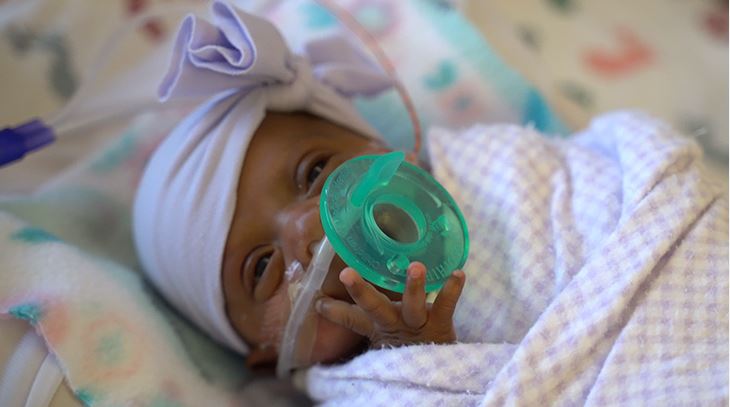World's Tiniest Baby Was the Size of an Apple. Here's How She Survived.

As far as tiny babies go, "Saybie" is the smallest of the small.
The baby girl was born in San Diego in December 2018 weighing a meager 8.6 ounces (245 grams), about the size of a large apple, according to a statement from Sharp Mary Birch Hospital for Women & Newborns, the hospital where she was born. She is the world's smallest surviving premature baby on record, the statement said.
Now, five months after her birth, Saybie — the nickname given to the baby by her nurses — is healthy and has finally been allowed to leave the hospital, weighing in at 5.6 lbs (2.5 kilograms). (The family wishes to remain anonymous to protect their privacy.)
Saybie was born via cesarean section at just 23 weeks and 3 days gestation after her mother experienced severe pregnancy complications. [7 Baby Myths Debunked]
"It was the scariest day of my life," Saybie's mother said in a video released by the hospital. "My blood pressure was very, very high. … They had to deliver her really quick. And I kept telling them that she's not going to survive, she's only 23 weeks."
The family was told that they would likely have just an hour with her before she died. "But that hour turned into 2 hours, which turned into a day, which turned into a week," the mother said.
Records of the tiniest surviving babies are maintained by the University of Iowa's Tiniest Babies Registry. Saybie's extremely low birth weight is 7 grams (0.2 ounces) less than the previous "smallest baby" record holder, a baby born in Germany in 2015. In February this year, doctors reported the birth of the smallest surviving baby boy, who weighed 9.45 ounces (268 grams) at birth.
Sign up for the Live Science daily newsletter now
Get the world’s most fascinating discoveries delivered straight to your inbox.
Perhaps aiding in her survival, Saybie experienced virtually none of the medical challenges typically associated with so-called micropreemies (those born before 28 weeks), which can include brain bleeds and lung and heart problems, the hospital said.
"We do everything we know how to do as well as we can, and after that, it's really up to our babies," Spring Bridges, a registered nurse at Sharp Mary Birch's neonatal intensive care unit (NICU), said in the video. "Some really have the strength to go through what they have to go through and grow outside the womb."
The hospital also specializes in caring for micropreemies. "Saybie was in the exact right spot, right time, for this to happen," said Courtney Akel, a registered nurse at Sharp Mary Birch's NICU.
Still, micropreemies can face challenges as they grow older, including vision problems, issues with fine motor skills and learning disabilities, according to The Washington Post.
For the next few years, Saybie will make regular visits to the hospital's follow-up clinic, which aims to help NICU babies meet developmental milestones, the Post reported.
- 11 Big Fat Pregnancy Myths
- Are You Pregnant? 12 Early Signs of Pregnancy
- 11 Facts Every Parent Should Know About Their Baby's Brain
Originally published on Live Science.

Rachael is a Live Science contributor, and was a former channel editor and senior writer for Live Science between 2010 and 2022. She has a master's degree in journalism from New York University's Science, Health and Environmental Reporting Program. She also holds a B.S. in molecular biology and an M.S. in biology from the University of California, San Diego. Her work has appeared in Scienceline, The Washington Post and Scientific American.
Man gets sperm-making stem cell transplant in first-of-its-kind procedure
'Love hormone' oxytocin can pause pregnancy, animal study finds










